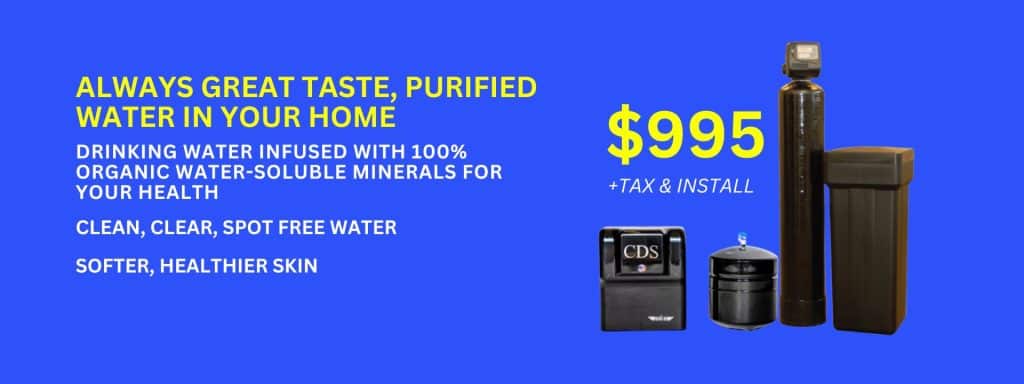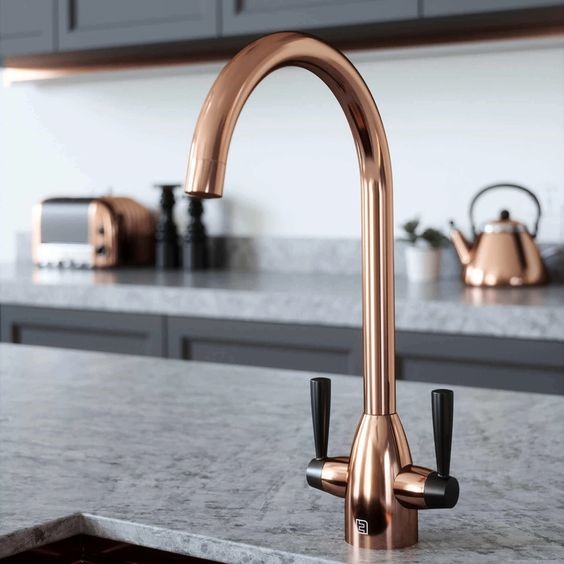Can softened water damage plants when watering?
Softened Water and its benefits for your family and does it help your plants as well?
Our comprehensive guide will help you understand the potential impact of softened water on plants and provide alternatives and best practices.
1. Softened Water Plant Damage
Softened water plant damage can be a significant concern for gardeners. When you use softened water, you’re essentially watering your plants with water that has had its calcium and magnesium ions replaced with sodium. This can lead to a buildup of salt in the soil, which can damage plant roots and hinder growth. While using water softeners makes household water gentler on appliances and skin, it can be detrimental to your garden. To avoid this, consider using a water filtration system specifically designed to remove harmful minerals without adding sodium. Understanding how to make hard water soft without relying on salt-based softeners can save your plants from potential damage.
2. Effects of Softened Water on Plants
The effects of softened water on plants can vary, but often, the high sodium content is a primary concern. This is particularly problematic for flower gardens, where delicate blooms may not tolerate the added salt. Softened water can lead to stunted growth, yellowing leaves, and even plant death. It’s essential to monitor your plants closely and consider using alternatives, such as filtered water for watering. Learning what does using water softener water do to your outdoor plants will help you make informed decisions to protect your garden’s health.
3. Softened Water and Plant Health
Using softened water can negatively impact plant health due to its high sodium levels. Sodium can displace essential nutrients in the soil, making it harder for plants to absorb the nutrients they need. Over time, this can lead to nutrient deficiencies and poor plant health. To ensure your plants thrive, it’s important to provide them with the best water for plants. Consider using water from a reverse osmosis system or installing a water softener bypass for outdoor taps to avoid the negative effects of softened water on your garden.
4. Impact of Softened Water on Soil
Softened water impacts soil by increasing its sodium content, which can alter the soil structure and reduce its fertility. High sodium levels can cause soil to become compacted, making it difficult for roots to penetrate and absorb water and nutrients. This can lead to poor plant growth and health. Understanding the effects of soft water on flower gardens can help you take preventative measures. Regularly testing your soil and amending it with organic matter can help mitigate the negative effects of softened water.
5. Water Softeners and Plant Watering
When it comes to plant watering, water softeners can be a double-edged sword. While they protect household appliances from hard water damage, the sodium they introduce can be harmful to plants. It’s crucial to understand that softened water might not be the best water for plants, especially for sensitive species. Using a water filtration system designed to remove hardness without adding sodium can provide a safer alternative for your garden.
6. Soft Water and Garden Plants
Using soft water in your garden can pose several challenges. The sodium in softened water can accumulate in the soil, leading to issues with plant health and growth. Some plants, particularly those sensitive to salt, can suffer significantly. Knowing what plants don’t like hard water and which can tolerate softer water can help you make better decisions for your garden. To ensure your garden thrives, consider using hard water alternatives like filtered water that doesn’t contain high sodium levels.
Free no obligation, no pressure consultation in your home or on the phone, your choice.
Leave your contact information or Call NOW 702-241-9000

7. Is Softened Water Bad for Plants?
Is softened water bad for plants? In many cases, yes. The high sodium content in softened water can disrupt nutrient uptake and lead to poor plant health. Sodium can replace essential nutrients in the soil, causing deficiencies and impacting plant growth. To avoid these problems, it’s best to use water sources that don’t introduce high levels of sodium, such as water filtered with a system that doesn’t rely on sodium exchange.
8. Softened Water Irrigation
Softened water irrigation can be problematic for your garden. The sodium in softened water can build up in the soil, leading to issues with plant health and soil structure. It’s crucial to find alternative water sources for irrigation, especially for sensitive plants. Learning how to make hard water soft without using a traditional water softener can help you avoid the pitfalls of softened water and provide your garden with the best possible care.
9. Salt in Softened Water and Plants
Salt in softened water can be detrimental to plants. High sodium levels can disrupt the soil’s nutrient balance and lead to poor plant health. Understanding the relationship between softened water and plant health is essential for any gardener. If you’re concerned about the effects of softened water on your garden, consider investing in a filtration system that removes hardness without adding sodium.
10. Hard vs. Softened Water for Plants
When comparing hard vs. softened water for plants, it’s important to consider the impact of each. Hard water contains minerals like calcium and magnesium, which are beneficial in small amounts but can cause buildup over time. Softened water, on the other hand, replaces these minerals with sodium, which can be harmful to plants. Knowing can you give plants very hard water or should you avoid it entirely is key. Using filtered water can help you provide the best possible water for your plants.
11. Can Softened Water Harm Plants?
Can softened water harm plants? The short answer is yes. The sodium in softened water can lead to nutrient imbalances and poor soil structure, both of which can negatively impact plant health. Understanding the effects of soft water on flower gardens and other plants can help you take steps to protect your garden. Using alternative water sources like filtered water can help mitigate the risks associated with softened water.
12. Watering Plants with Softened Water
Watering plants with softened water can introduce high levels of sodium into the soil, which can be harmful to plant health. Sodium can interfere with nutrient uptake and lead to poor plant growth. To avoid these issues, it’s important to consider alternative water sources. Knowing how to make hard water soft without relying on sodium-based softeners can help you provide your plants with the best water for optimal growth and health.
13. Softened Water and Plant Growth
The sodium in softened water can negatively affect plant growth by interfering with nutrient uptake and soil structure. Plants need a balanced mix of nutrients to thrive, and high sodium levels can disrupt this balance. Understanding what does using water softener water do to your outdoor plants can help you make informed decisions. Using alternative water sources like filtered water can help ensure your plants get the nutrients they need for healthy growth.
14. Safe Water for Plants
Safe water for plants is crucial for maintaining a healthy garden. While softened water can be harmful due to its high sodium content, there are alternatives available. Rainwater, filtered water, and water from a reverse osmosis system are all excellent choices. Knowing is softened water ok for grass and other plants can help you make the best decisions for your garden. Providing your plants with safe, nutrient-rich water is essential for their health and growth.
15. Softened Water Sodium Content
The sodium content in softened water can pose a risk to plants. High sodium levels can disrupt nutrient uptake and lead to poor soil structure. Understanding the effects of softened water on plants can help you take preventative measures. Using alternatives filtered water can help you avoid the negative impact of sodium on your garden. Learning how to make hard water soft without using a traditional water softener can also provide a safer option for watering your plants.
16. Alternatives to Softened Water for Plants
Finding alternatives to softened water for plants is essential for maintaining a healthy garden. Rainwater is an excellent choice, as it is naturally soft and free from harmful additives. Water from a reverse osmosis system or a filtration system that doesn’t rely on sodium exchange is also a good option. Knowing hard water bad for plants can help you understand the importance of providing your plants with safe, nutrient-rich water.
17. Water Softener Residue and Plants
Water softener residue can be harmful to plants due to its high sodium content. This residue can build up in the soil, leading to nutrient imbalances and poor plant health. Understanding the effects of softened water on plants can help you take steps to avoid these issues. Using alternative water sources like filtered water can help you provide your plants with the best water for optimal growth and health.
18. Mineral Content in Softened Water
The mineral content in softened water is often replaced with sodium, which can be harmful to plants. High sodium levels can disrupt nutrient uptake and lead to poor soil structure. Understanding what plants don’t like hard water and how to make hard water soft without relying on sodium-based softeners can help you provide your garden with the best water possible. Using alternatives like filtered water can ensure your plants get the nutrients they need for healthy growth.
19. Effect of Sodium on Plant Roots
The effect of sodium on plant roots can be detrimental, leading to nutrient imbalances and poor plant health. High sodium levels in softened water can interfere with nutrient uptake and soil structure. Understanding is softened water bad for plants and what does using water softener water do to your outdoor plants can help you make informed decisions. Using alternative water sources like filtered water can help you avoid the negative impact of sodium on your garden.
20. Healthy Water for Gardening
Healthy water for gardening is essential for maintaining a thriving garden. While softened water can be harmful due to its high sodium content, there are alternatives available. Filtered water, and water from a reverse osmosis system are all excellent choices. Knowing what plants don’t like hard water and
how to make hard water soft without using a traditional water softener can help you provide your plants with safe, nutrient-rich water.
Conclusion
Ensuring that your garden receives the best possible water is crucial for plant health and growth. While softened water can be harmful due to its high sodium content, there are many alternatives available. Using filtered water, or water from a reverse osmosis system can help you avoid the negative effects of softened water. Understanding the impact of sodium on plant roots and soil structure can help you make informed decisions to protect your garden.
By providing your plants with safe, nutrient-rich water, you can ensure they thrive and grow beautifully. Whether you’re caring for delicate flower gardens or robust grass lawns, understanding the best water practices is essential. Investing in a water filtration system can make a significant difference in the health and longevity of your garden. With the right knowledge and resources, you can turn your garden into a lush, vibrant oasis that flourishes year-round.

